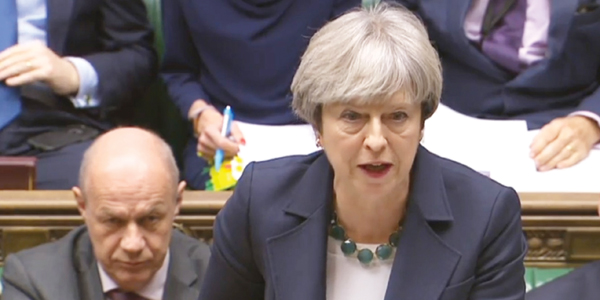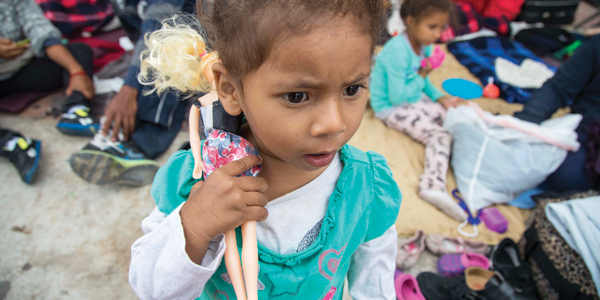This week the German government led by Angela Merkel might collapse due to her differences with her interior minister, Horst Seehofer, over migration policy. In the US, the administration of Donald Trump is separating children from parents caught crossing the Mexican border without a permit in the name of its “zero tolerance” approach to illegal immigration.
Mass immigration and mass deportation is perhaps the great moral issue of our times. The human drama of mass migration raises fundamental questions about how to arrive at a fair and just arrangement between the countries and communities from where refugees or migrants originate and the countries and communities that host them. Can the needs, rights and obligations of refugees or migrants be balanced with the needs, rights and obligations of citizens and residents? There are no simple answers to these questions. Political debate and policy-making tend to be dominated by two ideas of justice. Each is impoverished.
One idea of justice is strictly utilitarian, in effect reducing what is the most just solution to what is the most cost-effective, or the best value for money. In the EU referendum campaign, for example, the argument over immigration was almost entirely waged over its alleged costs or benefits to the economy as a whole. The impact of leaving or remaining on the wages of certain groups in society, or what pressures would be put on public services in specific parts of the country, were largely concealed from view. The utilitarian analysis tends to forget that no one is average.
The alternative approach reduces justice to individual rights or entitlements. Within the EU, the free movement of people is based on the idea of a universal freedom to pursue a better life elsewhere than in our country of origin. Surely, this way of thinking goes, everyone should have the right to live and work wherever they chose? But this is to ignore the effects of individual actions on families and communities. The libertarian analysis tends to forget that no one lives in a social vacuum.
Utility and freedom are both important values and neither should be neglected. But neither has much to say about what binds us together as human beings. Each is silent on what constitutes the common good and the good life. Christians believe that human beings have intrinsic worth because they are created in the image and likeness of God. They are not commodities produced for sale in the market, reducible to their monetary value. Each individual is, literally, “beyond price”. When human beings are treated as commodities, it leads to inhumane systems that disrupt personal relationships and durable patterns of life. People become treated as means, not ends. The sense that every life is sacred is violated.
Nor are human beings simply the bearers of individual rights. We have bodies, minds and souls. We are embedded in relationships and institutions – however difficult and dysfunctional they might be. Our rights are not simply personal possessions; they derive from a deeper sense of dignity and duties. The inalienable dignity of the person as enshrined in many national constitutions is perhaps the closest secular translation of the religious belief in the sanctity of life. Duties are obligations that we owe to ourselves and to others – being a parent, teacher or politician involves obligations to serve others. We have a duty to care for others and for their wellbeing; to lead by example.
In the Christian tradition, our duty is to love our neighbour “as ourselves”. For some, this means that love is predominantly reserved for those close to us in our home and in our community before being extended to the stranger, whatever hardship the stranger might have experienced. For others, it means that love should be directed first and foremost at the most vulnerable in this world – the poor, the oppressed, the very young and the very old, the persecuted, all those without a home.
This tension seems irresolvable. To whom do we owe our love? The Christian answer to this question is that we do not have to choose either/or. It is both/and. We owe our love to “people like us”, our kith and kin, and to “the Other”, to the stranger knocking on our door. Love of neighbour calls us to love the people who are our neighbours – the one who is in front of us, no matter where they are from or which group they might belong to. That is what we learn from the parable of the Good Samaritan; the traveller became a neighbour to the Samaritan and the Samaritan became a neighbour to the traveller.
But, if we are called to love those in front of us, does that rule out love for those living far away, like the Libyan refugee in an Italian camp, or the Mexican child detained at the US border? No. Of course, compassion and charity should be extended to refugees who have lost their homes and need shelter. At the same time, it is important not to become disconnected from our immediate neighbours in our desire to serve strangers. We are born into a particular place and are part of a local community. This is what gives us a sense of belonging. Only God can love all people equally. The Church is called to be a universal brotherhood of solidarity, especially solidarity with the poor, wherever they are from. In Catholic Social Teaching (CST), this is known as “the preferential option for the poor”.
The other key notion in CST is “the common good”. This brings something different to our understanding of justice. Rights or freedoms are mostly individual; utility is mostly collective. The common good, by contrast, combines personal fulfilment with mutual flourishing. As unique persons with unique talents, we can only make a contribution to society and realise our potential together with others. We are relational beings, not lone egos in an anonymous mass.
The common good is about the goods we only hold jointly – not just common land and shared resources but our relationships and friendships, and our shared language and culture; our songs, our favourite meals, the way we raise our children. None of these goods are captured by measures like national output. So, unlike rights or utility, the common good includes all the relationships between people that provide meaning.
As with love of neighbour, which balances love of “our people” with love of “strangers”, there is a balance to be struck between the preferential option for the poor and the common good. In forming a just migration policy, this suggests making a distinction between refugees who flee war and escape persecution, and migrants who leave behind deprivation and are in search of better opportunities. The plight of refugees and asylum seekers is a humanitarian catastrophe. The situation of many economic migrants is dire, but not as desperate. The preferential option for the poor suggests that refugees have a prior demand on our help over economic migrants.
Prosperous countries like Britain have a moral duty to welcome more refugees and provide them with proper help, not least because UK foreign policy and arms sales have been a significant factor in creating the refugee emergency since the summer of 2015, when hundreds of thousands of Syrians started fleeing their war-ravaged country. The obligation to welcome economic migrants from countries where there is no civil war or persecution does not apply to the same extent. While this might sound heartless, it is just the opposite. Mass emigration has profound social and cultural consequences for the societies of such “sending” countries.
As the former Archbishop of Canterbury, Rowan Williams, wrote last year, “mass migration produces a weakening of ordinary civil solidarities. In countries obliged to assume that a significant proportion of their people will be abroad for an indefinite number of productive years – productive not only financially, but in terms of shared public service and responsibility – excessive mobility of working populations hollows out the civic space. These are societies that are often already economically and socially vulnerable.”
The obligation of prosperous states is to help limit emigration by working with “sending” countries to provide more security and better living conditions. That is also the position of Pope Francis: “The Church stands at the side of all who work to defend each person’s right to live with dignity, first and foremost by exercising the right not to emigrate and to contribute to the development of one’s country of origin” (Message for the World Day of Migrants and Refugees, 17 January 2016). But, sadly, Western countries lack the political will to commit the resources necessary to make staying in a “sending” country a credible option. Failing that, more migrants will keep on arriving.
Another reason for the justice of privileging refugees over economic migrants lies with the wellbeing of “host” countries. Mass immigration can lead to a pace of change that is incompatible with a measure of social cohesion on which peaceful co-existence and the hospitable integration of migrants depends. CST suggests that we need to combine more generous funding for programmes of integration with the encouragement of creative ways of fostering respect for the laws and traditions of host countries. Only by cultivating a home that is stable and at ease with itself can we welcome others into it with neighbourly love.?
Adrian Pabst is reader in politics at the University of Kent and visiting professor at the Institut d’Etudes Politiques de Lille. He is co-author with John Milbank of The Politics of Virtue: Post-Liberalism and the Human Future.




 Loading ...
Loading ...
What do you think?
You can post as a subscriber user...
User Comments (0)